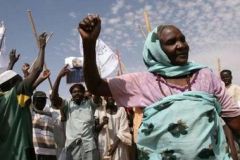Darfuris say war has created new tribe – refugee
October 27, 2007 (ABU SHOUK CAMP, Sudan) — Darfuris displaced by the conflict in western Sudan say years of fighting have created a new tribe in the region.

“I am not an Arab or African, I am a Darfuri and my tribe now is called Refugee. We are all refugees,” said elderly Mohamed Hassan Yagoub. “We have all suffered the same attacks.”
In Abu Shouk camp outside Darfur’s main town el-Fasher, Arab tribes who fled 4-1/2 years of rape, killing and looting live alongside non-Arabs who make up the majority of the 2.2 million people in camps throughout the region the size of France.
“In the beginning in the camp there were problems,” said Jamila Yehya Abakr. “When I went to get water they’d call me Janjaweed and say my people attacked them.”
Abakr is from the Arab Rizeigat tribe, Mahamied clan, from which many of the militia mobilised by the government were drawn. Darfuris dubbed the militia Janjaweed, loosely derived from the Arabic for devils on horseback.
The militia are accused of the worst atrocities of the conflict, including mass rape and murder. International experts estimate some 200,000 people have died since 2003, though the Sudanese government puts the figure at 9,000.
The images of light-skinned Arabs riding camels attacking African civilians have long characterised the conflict, and it is often described as a war between Africans and Arabs.
But refugees in Abu Shouk say that explanation is overly simplistic and minimises their suffering.
“This is not a tribal conflict. It is a political problem created by the government,” said Yagoub, who is of mixed African and Arab roots.
“Before this all the tribes used to live together without any differences.”
LANGUAGE, CULTURE
The difference between Arab and African in Darfur is not colour. Everyone is black although some are darker than others. Being “Arab” or “African” is more about language, culture and history.
But the war that began when rebels took up arms against the government charging neglect put civilians — Arab and African — on opposite sides of the conflict and that ignited tensions where they had not previously existed.
During the early days of the conflict when hundreds of thousands of people were driven from their homes by militias and government bombardment, they sought refuge around Darfur’s main towns and the first makeshift, miserable camps began to form.
Tensions then ran so high that in one incident non-Arabs beat an Arab to death in Kalma camp in South Darfur.
But as emotions calmed down, the Arabs said, living got easier and people began to understand the camp residents were all victims, essentially one tribe as Yagoub said, refugees.
Hawa Adam, an Arab from the Hawara tribe, shouted at her husband who said there were never any problems in the camps.
“You didn’t go to get water and have to listen to them calling me Janjaweed,” she told him angrily.
“But now it’s fine. People began to understand not all Arabs did this and that it is a political conflict.”
The Arabs in Abu Shouk had the same stories of losing family members and rape as refugees from the non-Arab Fur and Zaghawa tribes.
“A force suddenly appeared one day and surrounded our area made up of armed men, mostly Arabs and some Africans, dressed in military fatigues,” said one woman from the Arab Keeneen tribe.
“They used to take our money, gold and then even the mats from under our children’s bottoms.”
“They warned us to leave our homes because planes and men would come and kill us. Sure enough as they said — the planes came and bombed and we ran for our lives.”
Khaled Abdel Muti, an Arab in Abu Shouk from the Rizeigat, had a message for his tribal brothers who joined the militia, young men he said who were uneducated but were now seeing the error of their ways.
“Don’t be exploited by the government to fight against your brothers,” he said.
“The opposition in Darfur took up arms or the rights of all Darfuris including yours. You should join them, not fight them.”
(Reuters)
